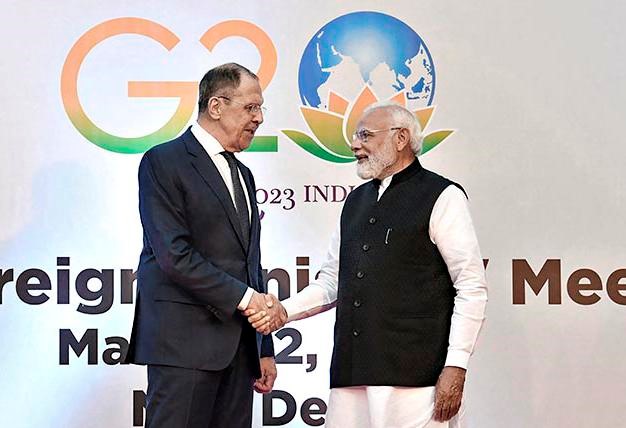Description

Disclaimer: Copyright infringement not intended.
Context: Deep divisions between the United States-led Western countries and the Russia-China combine upended India’s attempt to forge a consensus at the G-20 Foreign Ministers’ Meeting.
Details:
PM’s Appeal:
- The meeting in Delhi, which brought together the world’s 20 most-developed economies, saw sharp words exchanged by U.S. Secretary of State Antony Blinken, Russian Foreign Minister Sergey Lavrov and a number of other Foreign Ministers, despite an appeal from Prime Minister Narendra Modi at the start of the meeting to “rise above differences”.
- Prime Minister in a reference to the divide over the Ukraine war, hoped that the meeting “in the land of Gandhi and the Buddha” would inspire the G-20 delegates to “focus not on what divides us, but on what unites us”.
.jpeg)
No consensus like Bali declaration:
- The task was not an easy one given the state of polarisation in the world as done in Bali.
- Russia said, “The Bali Declaration took place half a year ago. A lot of events took place since then,” indicating the Ukrainian President’s announcement that he no longer would adhere to the Minsk Agreements with Russia, and pointing to the explosions on the Nord stream energy pipelines that Russia blames the U.S. carried out.
- S. said that the lack of a joint communique at the Foreign Ministers’ Meeting or going forward at the G-20 leaders summit was not an “issue” if there was consensus between most countries.
Chair’s Summary and Outcome Document:
- India named Russia and China as the reason the two paragraphs (three and four from G-20 Bali Document of 2022) pertaining to the war in Ukraine could not be reconciled.
Highlights:
- G20 Foreign Ministers met in New Delhi at a time when the world faces multi-dimensional challenges ranging from insufficient progress towards Sustainable Development Goals (SDGs), climate change, pollution and biodiversity loss, to economic slowdown, debt distress, uneven pandemic recovery, growing poverty and inequality, food and energy insecurity and global supply chain disruptions, aggravated by geo-political tensions and conflicts.
- Meeting under India’s G20 Presidency, with the theme ‘Vasudhaiva Kutumbakam’ - ‘One Earth. One Family. One Future’, the G20 Foreign Ministers deliberated upon current global challenges.
- They brought focus on strengthening multilateralism, food and energy security, ambitious climate and environmental action, deepening cooperation on sustainable development, counter-terrorism, counter-narcotics, global health, global talent pool, humanitarian assistance and disaster risk reduction, as well as gender equality and women’s empowerment.
- The war in Ukraine has further adversely impacted the global economy. There was a discussion on the issue. Countries reiterated their national positions as expressed in other fora, including the UN Security Council and the UN General Assembly, which deplores in the strongest terms the aggression by the Russian Federation against Ukraine and demands its complete and unconditional withdrawal from the territory of Ukraine. (this point not agreed by Russia and China)
- It is essential to uphold international law and the multilateral system that safeguards peace and stability. This includes defending all the Purposes and Principles enshrined in the Charter of the United Nations and adhering to international humanitarian law, including the protection of civilians and infrastructure in armed conflicts. The use or threat of use of nuclear weapons is inadmissible. The peaceful resolution of conflicts, efforts to address crises, as well as diplomacy and dialogue, are vital. Today's era must not be of war. (this point not agreed by Russia and China)

India, China discuss LAC situation:
- External Affairs Minister S. Jaishankar said he had discussed the “abnormal” current state of relations with China and the situation along the Line of Actual Control (LAC), as he held bilateral talks with visiting Chinese Foreign Minister Qin Gang.
- The meeting — a first between the two Ministers, with Mr. Qin having been appointed in December 2022 — was focused on addressing “challenges in the bilateral relationship” and specifically the peace and tranquillity on the border.
- The two sides last week held their first in-person high-level border talks in more than three years
|
PRACTICE QUESTION
Q) Discuss the importance of India’s G-20 Presidency in the context of multi-dimensional challenges that the world faces. (150 words)
|

https://epaper.thehindu.com/ccidist-ws/th/th_delhi/issues/27149/OPS/GFGAUMKVD.1+GG3AUNDEO.1.html










